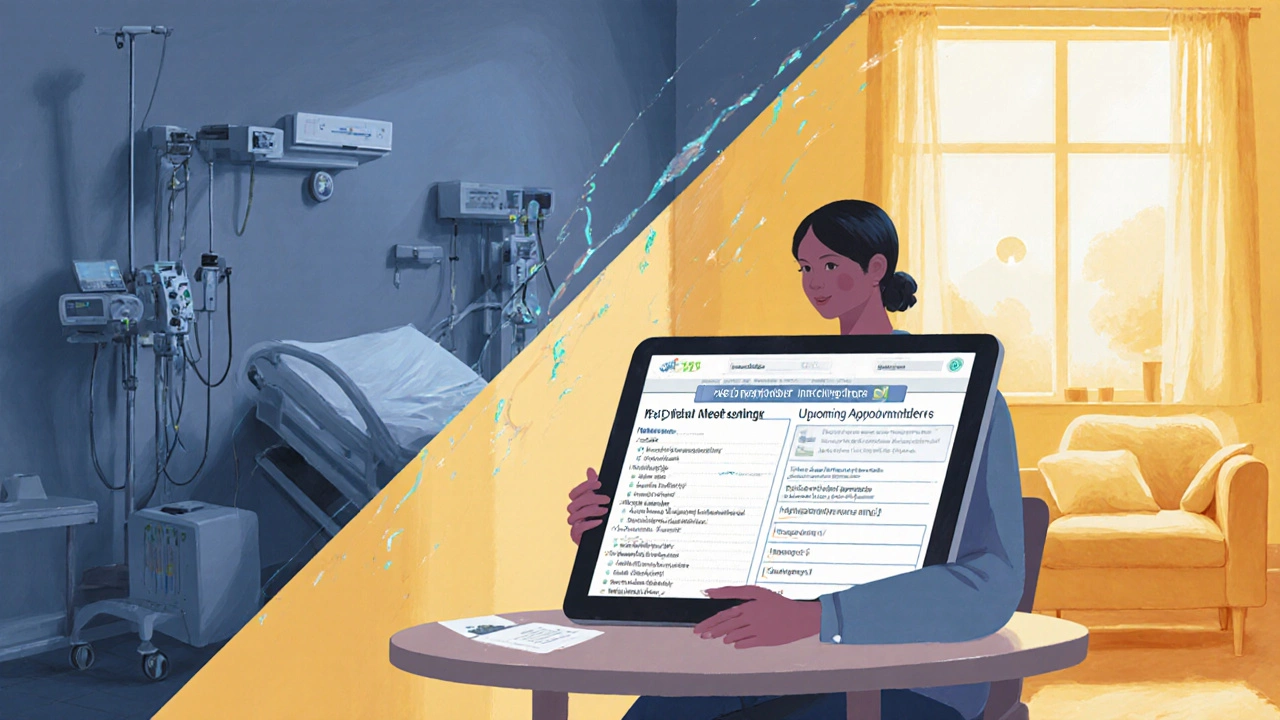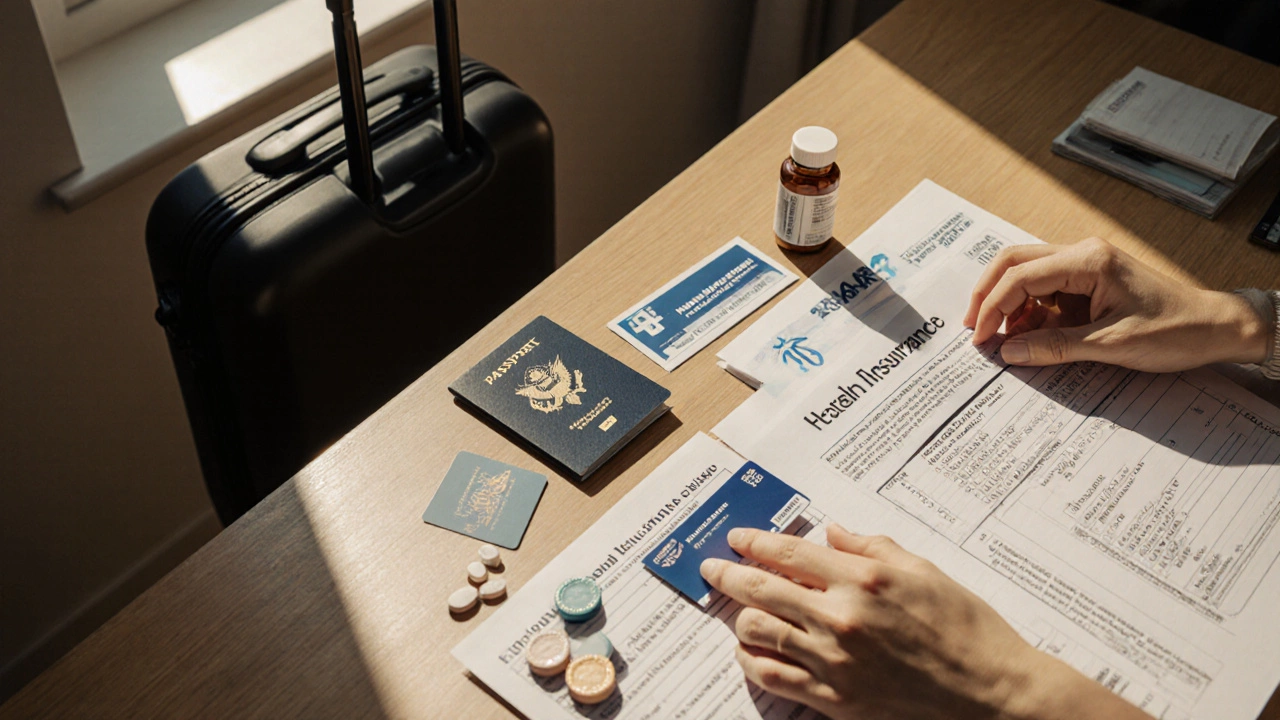Hospital Care Abroad Cost Calculator
Estimate Your Medical Costs Abroad
Enter basic information to get an estimate of potential medical costs when traveling abroad.
Estimated Costs
Important: This is an estimate based on general pricing data. Actual costs may vary based on your specific condition, hospital, and insurance coverage.
Always ask for a written cost estimate before treatment and verify your insurance coverage details with your provider.
Key Takeaways
- Know your insurance coverage and have a backup payment plan before you travel.
- Carry a translated copy of your medical records and a list of current medications.
- Understand the admission process: passport check, consent forms, and possible language interpreters.
- Check the hospital’s accreditation and ask about cost transparency up front.
- Plan post‑discharge follow‑up both abroad and back home.
When you find yourself needing urgent care while abroad, Medical Tourism is the practice of traveling across borders to receive medical treatment, whether planned or emergency. The experience can feel chaotic-different language, unfamiliar paperwork, and unknown costs-but a clear roadmap helps you stay in control. Below is a step‑by‑step guide that covers everything from pre‑travel prep to post‑discharge care, so you know exactly what happens if you have to go to the hospital in another country.
1. Preparing Before You Leave: The Safety Net Checklist
Even if your trip is for leisure, treating the possibility of an emergency as a checklist item can save you headaches later. Here’s what to do at least two weeks before departure:
- International Health Insurance: Purchase a policy that covers hospitalization, surgery, and repatriation. Verify that the insurer has a 24/7 hotline in the destination language.
- Travel Medical Assistance: Some insurers offer a separate assistance service that coordinates hospital placement, translation, and billing.
- Document Translation: Get an official English (or your native language) translation of key medical records: chronic conditions, allergies, current meds, and recent test results.
- Medication Supply: Bring at least a 30‑day supply of prescription drugs, plus a copy of the prescription with generic names.
- Visa & Entry Requirements: Some countries require proof of health coverage or a negative COVID‑19 test for entry.
Having these items ready means you won’t waste precious time hunting for paperwork when you’re already in a hospital lobby.
2. Arrival at the Hospital: What the Front Desk Looks Like
Because each country follows its own administrative rules, the admission process can vary, but most hospitals share three core steps:
- Identity Verification: Show your passport, visa, and insurance card. The staff will copy your passport and record your nationality for billing purposes.
- Medical Triage: A nurse assesses your condition, records vital signs, and flags any allergies. If you’re unconscious or unable to speak, the doctor will rely on your travel companion or emergency contacts.
- Consent Forms: You’ll be asked to sign treatment consent, data‑privacy agreement, and a cost‑estimate form. If language is a barrier, most international hospitals provide a professional interpreter or a bilingual staff member.
Ask for a written cost estimate before any major procedure. In many Asian and Eastern European hospitals, the estimate is provided in the local currency and in English.

3. Managing Costs: Paying While You’re Still Abroad
Hospital bills abroad can be surprising. Here’s how to keep the financial shock at bay:
| Option | Coverage Scope | Pros | Cons |
|---|---|---|---|
| Self‑Pay | All services billed directly to you | Immediate payment, no insurance paperwork | High out‑of‑pocket cost, currency exchange risk |
| International Health Insurance | Hospitalization, surgery, medication, repatriation | Negotiated rates, protection against massive bills | Pre‑authorization may delay urgent care |
| Travel Assistance Service | Hospital placement, translation, direct billing to insurer | Hands‑free coordination, helps with paperwork | Extra service fee, limited to partner hospitals |
When you receive the final invoice, request an itemized breakdown. If the bill seems inflated, you can appeal to the hospital’s billing department or your insurer’s dispute team.
4. Legal Rights and Language Barriers
Understanding your patient rights abroad protects you from misunderstandings:
- Hospital Accreditation: Look for JCI (Joint Commission International) or local equivalents. Accredited facilities follow internationally recognized safety standards.
- Informed Consent: You must receive clear explanations of procedures, risks, and alternatives. If you can’t read the language, ask for an interpreter before signing.
- Data Privacy: Many countries follow GDPR‑like regulations; however, some may share data with government health agencies. Ask how your records will be stored and who can access them.
- Legal Recourse: If you feel mistreated, you can contact your embassy, the local health ombudsman, or the hospital’s patient‑rights office.

5. After Discharge: Follow‑Up at Home and Abroad
Leaving the hospital isn’t the end of care. A smooth transition reduces complications:
- Discharge Summary: Request a printed and electronic copy of the summary, including diagnoses, procedures, medications, and follow‑up appointments.
- Prescription Transfer: If you need medication unavailable at home, arrange a tele‑consultation with a local doctor who can prescribe a refill.
- Rehabilitation Plans: Some hospitals offer remote physiotherapy sessions via video call-use them if you can’t travel back.
- Insurance Claim Submission: Submit the itemized bill, discharge summary, and any additional receipts within the insurer’s time window (usually 60 days).
Keep a folder (physical or digital) with all documents; you’ll thank yourself when the paperwork for your home doctor or insurer arrives.
6. Quick Checklist for Travelers Facing Hospitalization Abroad
- Passport, visa, and a photocopy of each.
- International health insurance card and 24/7 hotline number.
- Translated medical records and medication list.
- Cash or credit card in local currency for possible co‑pay.
- Contact info for your embassy or consulate.
- Phone number of a trusted travel assistance service.
Frequently Asked Questions
Can I use my local health insurance while abroad?
Most domestic policies only cover emergencies within the home country. A few offer limited overseas coverage, but you’ll usually need a separate international plan for full protection.
What if I don’t speak the local language?
Ask for a professional interpreter at the admission desk. Many hospitals have English‑speaking staff or can connect you to a remote translation service at no extra charge.
How do I handle the bill if my insurance refuses to pay?
First, request an itemized invoice and verify that all services were pre‑authorized. Then, file an appeal with your insurer, providing the invoice, medical records, and a letter from the treating physician. If the dispute remains, you can seek help from your embassy’s consular services.
Is repatriation covered automatically?
Only if you purchased a plan that includes medical evacuation. Without that coverage, you’ll need to arrange and pay for transport yourself, which can run into tens of thousands of dollars.
What should I do if the hospital asks for a deposit?
Most hospitals require a cash or credit‑card hold before treatment. Confirm the amount, get a receipt, and note the hold’s release date. Your insurance may reimburse the deposit after the claim is approved.
